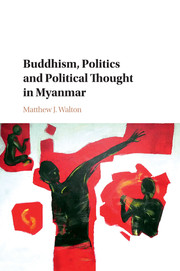Book contents
- Frontmatter
- Dedication
- Contents
- Acknowledgments
- A Note on Language and Usage
- Introduction
- 1 A Brief Political History and Cast of Characters
- 2 Building Blocks of a Moral Universe
- 3 On Human Nature and the Nature of Politics
- 4 Order and Freedom/Liberation: Purposes of Politics
- 5 What is “Politics” and What Constitutes “Participation”?
- 6 Discipline, Rights, and Morality: “Democracy” in Contemporary Myanmar
- Conclusion
- Appendix Glossary of Burmese and Buddhist Terms
- Bibliography
- Index
3 - On Human Nature and the Nature of Politics
Published online by Cambridge University Press: 22 December 2016
- Frontmatter
- Dedication
- Contents
- Acknowledgments
- A Note on Language and Usage
- Introduction
- 1 A Brief Political History and Cast of Characters
- 2 Building Blocks of a Moral Universe
- 3 On Human Nature and the Nature of Politics
- 4 Order and Freedom/Liberation: Purposes of Politics
- 5 What is “Politics” and What Constitutes “Participation”?
- 6 Discipline, Rights, and Morality: “Democracy” in Contemporary Myanmar
- Conclusion
- Appendix Glossary of Burmese and Buddhist Terms
- Bibliography
- Index
Summary
In the 1950s and 1960s, the political scientist John Badgley conducted research on politics in Burma at regional and local levels. He found that villagers were reluctant to use the phrase nain ngan ye (the common term for “politics”) to describe political activities in their own communities (1965, 71). Instead, they referred to traditional practices of cooperative action, compromise and reconciliation as a-yu a-hsa (beliefs) or a-tway a-hkaw (ideas). On the one hand, many of them saw national politics in the 1950s as sufficiently partisan and dysfunctional that they chose to disassociate themselves from nain ngan ye and its increasingly negative connotations. But additionally, most saw nain ngan ye as a state-centric, elite-level practice in which they were not included and that did not mirror their own daily practices, although many outside observers would likely classify them as “politics.”
Particular and bounded understandings of nain ngan ye still persist in Myanmar today. When conducting a discussion on the differences between politics and nain ngan ye with a class of Burmese university freshmen in July 2014, I asked them if there were any groups in the country that were not supposed to engage in nain ngan ye. Expecting the first answer to be monks (about which more in Chapter 5), I was taken aback when someone responded by saying “government workers.” These students understood nain ngan ye to inherently mean party politics, from which public servants were discouraged from participating. Over the course of our subsequent discussion, we identified many practices that they acknowledged might easily be classified as “politics” yet were certainly not understood by most people to be included in the category of nain ngan ye.
The idea that the word nain ngan ye inherently connotes party politics can also be seen in contrast with another popular term, a-myotha nain ngan ye, or “national politics.” It has been in circulation at least since the 1940s and it was common throughout the period of military rule for leaders to insist that this was the type of politics the military engaged in. Senior General Saw Maung, who led the State Law and Order Restoration Council after the 1988 coup, repeatedly said that he did not “know politics,” meaning the party politics that the military despised (Houtman 1999, 69).
- Type
- Chapter
- Information
- Buddhism, Politics and Political Thought in Myanmar , pp. 65 - 95Publisher: Cambridge University PressPrint publication year: 2016



